Have Your Say: What is your experience with niche hospitality markets and what is their impact on the sector?
At Design Insider we recognise the expertise within commercial interiors and we are proud to instigate conversations which inform, challenge & inspire the people who make our sector thrive.
We’ve brought together industry experts to share their perspectives on the growing niche markets in the hospitality sector by asking: What is your experience with niche hospitality markets and what is their impact on the sector?
From wellness-oriented experiences to eco-conscious choices, each industry leader sheds light on the impact of these niche trends and how they are shaping the evolving landscape of the hospitality industry. As travellers seek more personalized and meaningful experiences, these insights offer valuable considerations for those in the hospitality sector, whether you’re involved in interior design, hotel management, or guest services. Discover what these experts have to say about the transformative power of these niche markets in hospitality.
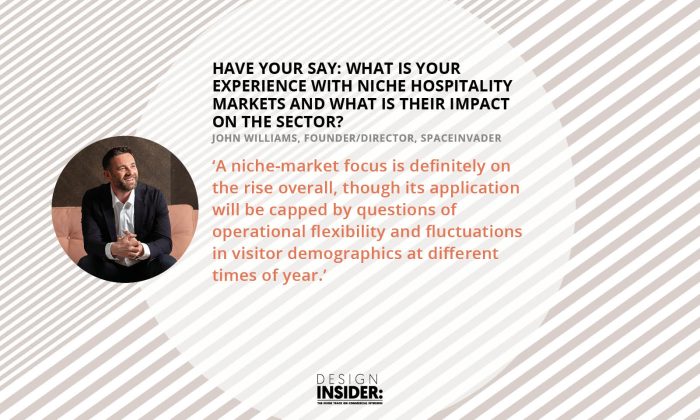
Whilst we’re not currently working on an entire hotel embodying one element of these niche categories, what we are seeing right now is segmentation within hotels. For example, for one mainland European project, we’re creating room typologies based either on business or ‘sanctuary-seeking’ leisure guests. For the former, the design involves the creation of an ante-room where a meeting could be held without sight of the bed chamber beyond. For the latter, the experience is built around the bed as the central incorporation of comfort and wellbeing.
Eco thinking, meanwhile, is present at every level, from vegan food offers to ensuring seasonal and local F&B suppliers. A niche-market focus is definitely on the rise overall, though its application will be capped by questions of operational flexibility and fluctuations in visitor demographics at different times of year.
John Williams, Founder/Director, SpaceInvader
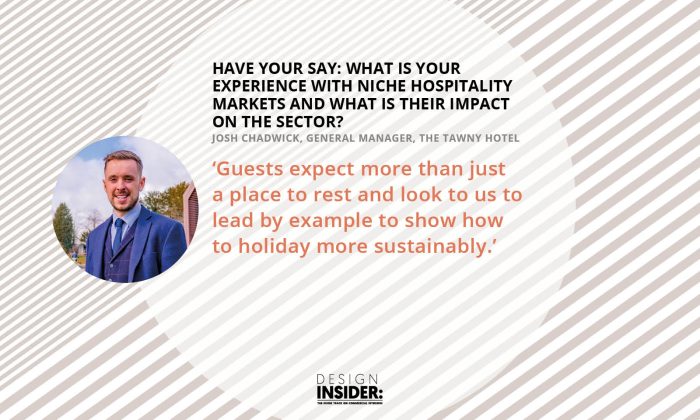
Experience led escapes are here to stay, alongside a rise in environmentally conscious choices, inviting growth for responsible tourism.
We’ve just installed 14 EV charging points and over 100 solar panels and battery, enabling a large proportion of day-to-day operations to be run via renewable energy – and is predicted to generate a 20 tonne decrease in carbon emissions.
Guests expect more than just a place to rest and look to us to lead by example to show how to holiday more sustainably. We’re responding by continuing to invest and innovating, for example via our upweighted nature-led experience offering – from forest bathing to Kombucha workshops.
It’s about offering a solution for guests, the freedom to escape the everyday and reconnect with the nature world – without compromising on standards or service. Personalisation for us is key opting for a less traditional, in keeping with our deconstructed design, holistic approach to hospitality.
Josh Chadwick, General Manager, The Tawny Hotel
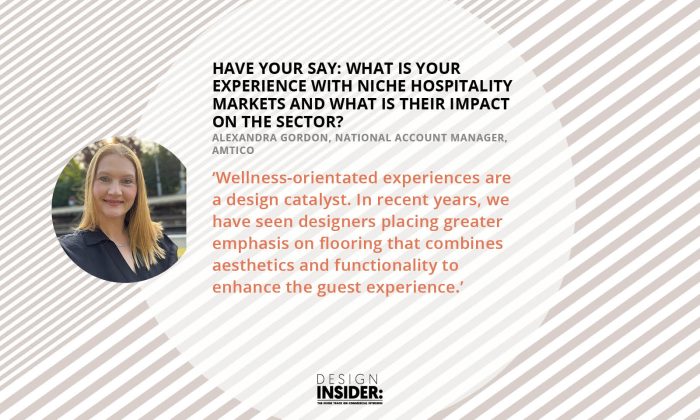
Within the ever-evolving hospitality sector, wellness-orientated experiences are a design catalyst. In recent years, we have seen designers placing greater emphasis on flooring that combines aesthetics and functionality to enhance the guest experience. For instance, luxury vinyl tile (LVT) flooring is much more than nature-inspired products and biophilic-friendly design. We are seeing a trend for specifying floors that improve guests’ wellbeing with a thoughtful fusion of calming design, functionality such as acoustic backing layers and antimicrobial technology, as well as sustainability-conscious products made from low-carbon materials.”
Alexandra Gordon, National Account Manager, Amtico
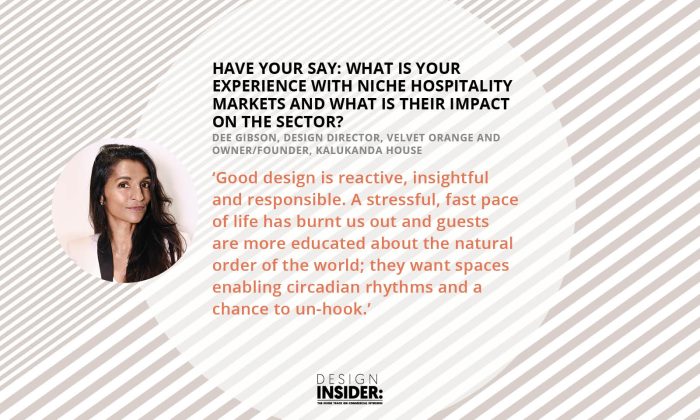
Guests want more. Good design is reactive, insightful and responsible. A stressful, fast pace of life has burnt us out and guests are more educated about the natural order of the world; they want spaces enabling circadian rhythms and a chance to un-hook. Mindful activities like traditional yoga, meditation and forest bathing all set in nature are on the rise. Previously we designed so guests could work anywhere, but I am seeing people who want to escape and slow down. “Out of office” is literal now.
Experiences focussing on cultural exchanges and educating kids are in demand so destinations must consider building ethically and incorporating spaces and opportunities to connect. I see the hospitality sector playing a vital role in local grass roots community initiatives too. Designers must be at the table in creating the brand DNA and values of their projects as the building is just the start of a travel experience.
Dee Gibson, BIID Member, Design Director, Velvet Orange and Owner/Founder, Kalukanda House
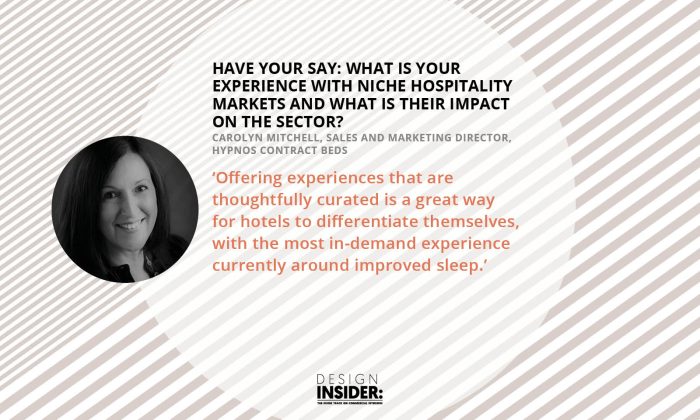
Hospitality, specifically the boutique sector, has traditionally been driven by design, creating a beautiful experience and stay for guests. However, with customer expectations continuously evolving, it is no longer enough for hotels to be just a ‘pretty place to stay’. Whether staying for business or leisure, guests want something that enhances their wellbeing, with 51% of consumers choosing a hotel based on the personalised service it can provide[1].
Offering experiences that are thoughtfully curated is a great way for hotels to differentiate themselves. With the most in-demand experience currently around improved sleep, hotels that offer thoughtful experiences such as sleep playlists or even pillow menus, offer a way to capture consumer interest and stand out from their competitors. It’s all about offering experiences focused on wellness, rather than embracing a jam-packed itinerary.
Better sleep has numerous positive effects, and hotels can embrace this by offering a more holistic approach to wellness. Naturally, this starts with the bed and it shouldn’t be overlooked. A guest’s experience starts with a comfortable bed delivering a restful and rejuvenating night’s sleep. It’s fair to say the bed isn’t just a basic necessity, it’s an elevation of the wellness experience and the pinnacle of a sound sleep. If hoteliers focus on this, they’ll be able to create lasting impressions and repeat business.
Carolyn Mitchell, Sales and Marketing Director, Hypnos Contract Beds
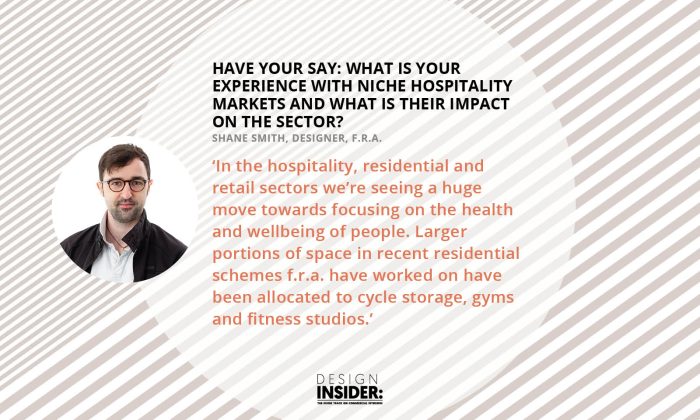
In the hospitality, residential and retail sectors we’re seeing a huge move towards focusing on the health and wellbeing of people. Larger portions of space in recent residential schemes f.r.a. have worked on have been allocated to cycle storage, gyms and fitness studios. Increasingly FitWel certification – the world’s leading certification system for optimising building design and operations for human wellbeing – is becoming more sought after. Our wayfinding solutions for hospitality and retail destination Angel Central in Islington – the UK’s first site to achieve a 2-star rating in the Fitwell framework – align with this, featuring messages to promote the healthier use of stairs rather than taking lifts or escalators and site wide maps showing walking distances to local parks and other must-see places to visit. Customers want to feel cared for, they want feel-good experiences and are increasingly voting with their money, so we’ll see many more schemes head in this direction.
Shane Smith, Designer, f.r.a.
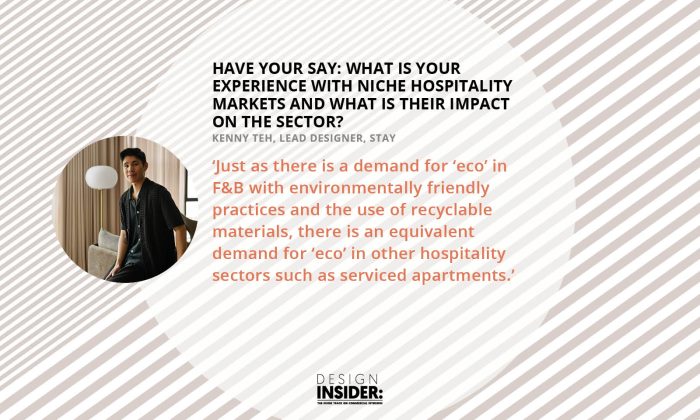
Just as there is a demand for ‘eco’ in F&B with environmentally friendly practices and the use of recyclable materials, there is an equivalent demand for ‘eco’ in other hospitality sectors such as serviced apartments. It can be linked to how a space is carefully crafted, the careful selection of materials and the care that is put into the process from inception.
Given the booming retrofit industry in London, it may not always be an opportunity to consider eco-design from the ground up. However, it is increasingly important to focus on the elements at the granular level. From the careful choice of natural materials that can improve the indoor ecosystem to small measures like carpets made from recycled plastic bottles. These conscious steps not only promote eco in design but also enrich the holistic experience within the space, both immediate and intangible.
Kenny Teh, Lead Designer, STAY
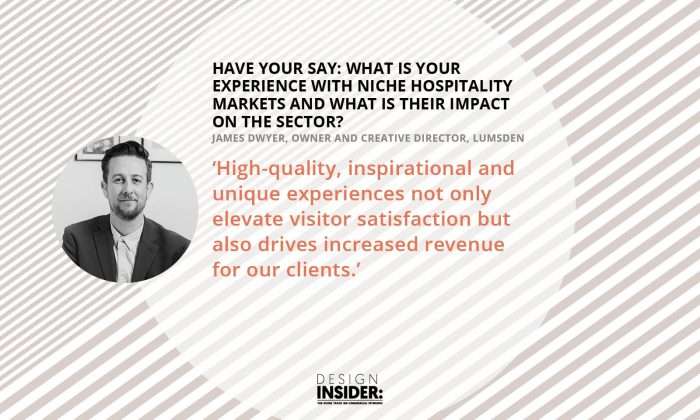
The rise of these niche trends reflects the growing demand for personalised and meaningful experiences that connect people with their passions. With time more precious than ever before, travellers are no longer content with conventional stays; they seek immersive, eco-conscious and rejuvenating options.
Drawing from our experience in the cultural and visitor destination sectors, we understand the significance of creating immersive, multi-sensory, story-driven experiences. High-quality, inspirational and unique experiences not only elevate visitor satisfaction but also drives increased revenue for our clients.
By embracing trends including wellness and sustainability, businesses have an opportunity to differentiate themselves in a competitive market. These strategic shifts not only cater to evolving preferences but demonstrates a commitment to our shared futures, positioning brands for long-term success.
James Dwyer, Owner and Creative Director, Lumsden
For our next Have Your Say article we are asking: Why is/isn’t the commercial market in the US a growth area for UK designers/suppliers?
We would love to publish your opinion, please email your answer (50-150 words), name, title, company and portrait to alys@designinsiderlive.com Copy deadline 20th November.




